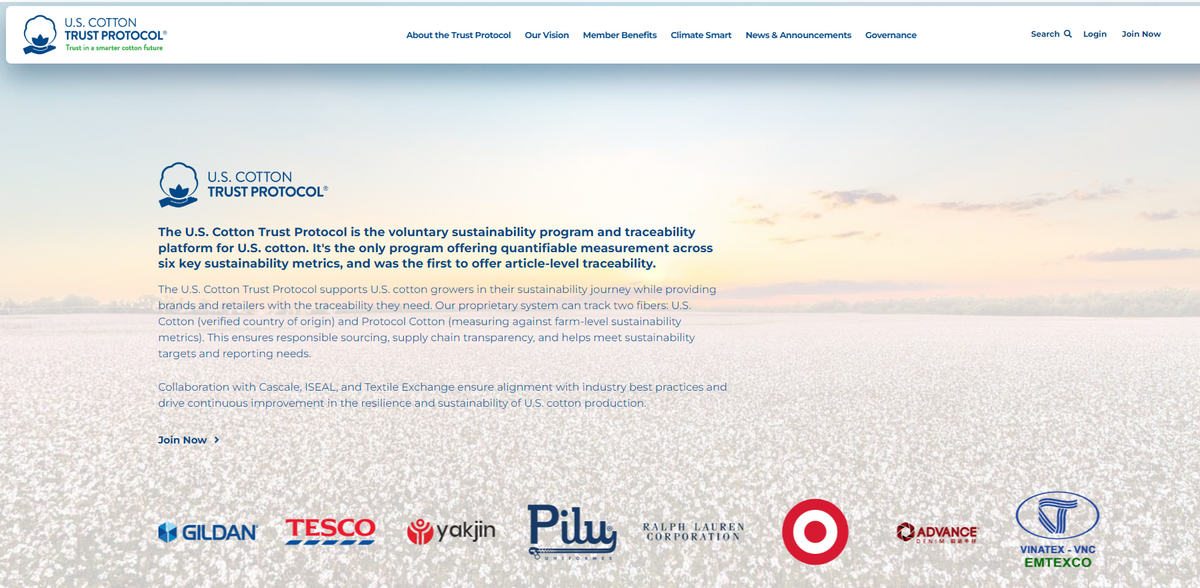What the Project Is
The U.S. Cotton Trust Protocol is the voluntary sustainability program and traceability platform for U.S. Cotton. It supports U.S. cotton growers in their sustainability journey while providing brands and retailers with the traceability they need. The protocol’s mission is all about responsible sourcing and supply chain transparency. Using a proprietary system, it can track two fibers: U.S. Cotton (with a verified country of origin) and Protocol Cotton (which measures against farm-level sustainability metrics). Essentially, this means that every step of cotton production is measurable and transparent… ensuring that sustainability targets and reporting needs are met with real, quantifiable data.
Main Benefits and Key Figures
The Trust Protocol delivers tangible value by not only enhancing environmental stewardship but also by recognizing growers’ commitment to responsible production. The program brings several key benefits to the table:
- Supports U.S. cotton growers along their sustainability journey.
- Tracks two distinct fibers: verified U.S. Cotton and Protocol Cotton based on sustainable practices.
- Ensures responsible sourcing and full supply chain transparency.
- Delivers quantifiable and verifiable goals through six key sustainability metrics.
- Accredited by, and an active member of, many recognized sustainable organizations and initiatives.
Responsible Production and Sustainability
The Trust Protocol is dedicated to providing tangible value to cotton growers. Not only does it support environmental stewardship, but it also enhances market access and acknowledges the commitment required for responsible production. In today’s world, transparency is more important than ever… and this program helps create a more sustainable and transparent world. The protocol focuses on creating a positive impact by measuring outcomes, driving innovation, and ultimately assuring trust in U.S. Cotton.
Continuous Improvement Metrics
This program is distinctive because it is the only system that provides quantifiable and verifiable goals and measurement. It drives continuous improvement across six key sustainability metrics – land use, soil carbon, water management, soil loss, greenhouse gas emissions, and energy efficiency. These metrics ensure that improvements are not just aspirational but are tracked in measurable ways. Growers can gauge their progress, adjusting practices to achieve better sustainability outcomes. It’s a simple yet powerful approach that turns environmental responsibility into a data-driven journey.
Global Sustainability Initiatives
Environmental impact extends beyond the fields, and the Trust Protocol is proudly aligned with recognized global sustainability initiatives. For instance, it contributes significantly to UN SDG 6 – Clean Water and Sanitation – by encouraging grower members to optimize water management and reduce runoff pollution. Moreover, it is aligned with UN SDG 13 – Climate Action. Cotton, as a raw material, has the natural ability to remove greenhouse gases from the atmosphere and, through improved soil health and innovative technologies, further underscores its commitment to climate action. It’s exciting to see such a strong link between sustainable agriculture and global environmental goals.
Project Impact
- UN SDG 6 – Clean Water and Sanitation: Optimized water management reduces runoff pollution.
- UN SDG 13 – Climate Action: Enhanced soil health and innovative technologies help remove greenhouse gases from the atmosphere.
Industry Expertise and Leadership
Deepika Mishra plays a vital role in the U.S. Cotton Trust Protocol as the Standards and Data Lead. Acting as a consultant for the program, Deepika leads the analysis of environmental metrics and collaborates extensively with agricultural research institutions, conservation groups, and food and trade organizations. Her role is crucial in the establishment of sustainability and social standards within the cotton industry. With over a decade of experience covering diverse agricultural projects in the United States and India, Deepika’s expertise spans crops like cotton, cowpeas, castor, sesame, guar, guayule, tomato, and even field pennycress used as a cover crop. Earning her Ph.D. in plant and soil science from Texas Tech University, with a specialization in cotton breeding and genetics, her work clearly highlights the balance between scientific rigor and real-world impact. Her contributions ensure that the Trust Protocol not only meets but exceeds modern sustainability standards.
The U.S. Cotton Trust Protocol stands out as the first sustainable cotton fiber program to offer article-level supply chain transparency. Accepted as a community member of ISEAL, only eighteen months after its launch, the protocol has quickly garnered respect and recognition within the industry. The program remains firmly aligned with sustainability initiatives with the primary goal of improving environmental impact. This innovative platform creates a dynamic ecosystem where cotton growers, brands, and retailers can thrive in a transparent and sustainable market.


















